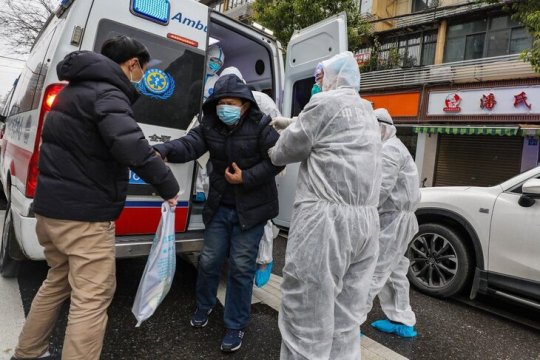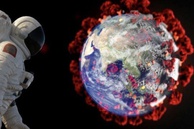Things look like it is high time we learned the first lessons from the ongoing fight against the coronavirus epidemic in China and beyond. And not from the medical point of view alone, but also in terms of the socio-economic, political and international aspects of this unprecedented epidemic that has caused massive upheavals and market panic that threatens to become a “new reality.”
China, which has taken the toughest measures to combat COVID-19, is facing serious challenges, both economic and strategic. Speaking at a February 23 meeting of the coordinating committee on socio-economic development and the fight against coronavirus, President Xi Jinping said that the country should resolutely accomplish the task of alleviating poverty despite the impact of the epidemic, and called for urgent efforts to help migrant workers return to their workplace and take care of peasants who are in need, as well as those losing their family members due to the epidemic. From this statement it is clear that for China, the fight against the COVID-19 epidemic and the fight against poverty, which the coronavirus epidemic has only exacerbated, are closely intertwined.
Under the present circumstances, the root of the problem is measures to limit human mobility introduced to check the spread of the epidemic, above all the sharp decrease in the mobility of migrant workers from villages. According to China’s National Bureau of Statistics, their number currently exceeds 290 million. This has negatively impacted both rural and urban economies, resulting in a shortage of labor in cities and rising unemployment in villages.[1]
The fight against the epidemic is already creating a "new reality" and, surprisingly, this is not always bad. Because of the coronavirus epidemic, all of China’s schools and universities have switched to online education in one of the world’s largest educational experiments, with an estimated 170 million schoolchildren and students studying remotely. [2] I think that this practice will come in handy also under normal circumstances, and not only in China.
But still, the main thing for the Chinese now is to reinvigorate their economy. Observers expect an early easing of measures limiting people’s mobility (I believe this could happen in March). Such forecasts are supported by the recent change in the epidemiological situation, with the spread of the virus, its virulence and mortality rate now showing signs of declining. Against this background, the authorities believe that it no longer makes sense to drastically limit employees’ mobility and access to enterprises. If this happens, then, of course, this would send a clear signal to the rest of the world.
Unfortunately, other countries (Italy, South Korea and Iran) are now becoming the main source the coronavirus epidemic is spreading from. After conducting a survey of leading Western scholars and experts, Le Figaro concludes that today the practice of border closures and travel bans is no longer as efficient as before because billions of people keep traveling the world and, as the example of Italy shows, the virus spreads faster than the borders can be closed.
“Now that the coronavirus has burst out of its Chinese cradle, closing borders looks even more useless. For the rest of the world, shutting borders would prove a highly effective solution only if we were able to break ties by 100 percent, which is impossible. And even if we did, the socio-economic functioning of our societies would collapse," the newspaper writes. [3]
This is not to say, of course, that we need to completely roll up quarantine measures. The thing is that per se they are not a cure-all and complete isolation will only lead to the destruction of national economies and the global economy, and slow down the fight against the coronavirus itself.
It should be borne in mind that faced with the threat of a pandemic, governments find themselves under pressure. They are trying to make people believe that they are acting decisively to protect their citizens, because otherwise they will have to pay dearly for not doing that. This leads to both “excesses of the performer” and to a kind of “competition” where each government is trying to show that the measures it is taking in this field are the most drastic of all.
Since the United States was the first to respond to this threat and in the toughest of ways too, (obviously due to its current tensions with China), each country needs to find its own way here. Russia is still a leader here and is even held up by the WHO as an example for others to follow. That being said, the situation remains very complicated as more and more people are being infected worldwide and no recipe is yet in sight to tackle the problem of “coronavirus vs. the economy.”
The views of the author may not necessarily reflect the position of the Editorial Board.
------------------------------------------------------------------------------
[1] “We’ll not slide into poverty. The fight against the COVID-19 epidemic and the fight against poverty in China, are closely intertwined,” https://rg.ru/2020/02/26/si-czinpin-borba-s-koronavirusom-i-nishchetoj-v-kitae-nerazryvno-sviazany.html
[2] “The coronavirus has changed the system of education of a whole country,” https://rg.ru/2020/02/29/koronavirus-izmenil-sistemu-obrazovaniia-celoj-strany.html
[3] “Closing borders because of the coronavirus is an attractive, but inefficient idea,” https://www.inopressa.ru/article/26Feb2020/lefigaro/coronavirus.html
read more in our Telegram-channel https://t.me/The_International_Affairs

 10:53 04.03.2020 •
10:53 04.03.2020 •



























